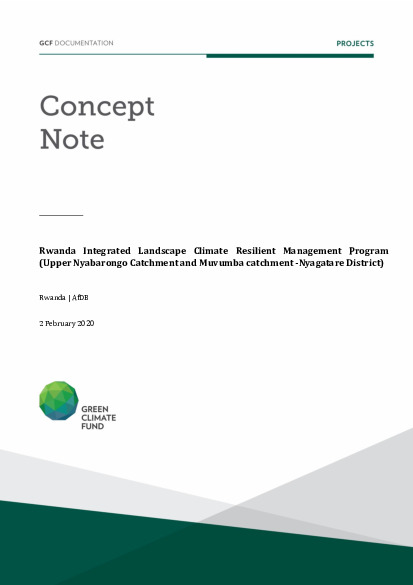Rwanda Integrated Landscape Climate Resilient Management Program (Upper Nyabarongo Catchment and Muvumba catchment -Nyagatare District)

Rwanda Integrated Landscape Climate Resilient Management Program (Upper Nyabarongo Catchment and Muvumba catchment -Nyagatare District)
The proposed GCF financed “Rwanda Integrated Landscape Climate Resilient management program (Upper Nyabarongo Catchment and Muvumba catchment - Nyagatare District)” builds onto the AfDB financed baseline project – the Muvumba Multipurpose Water Resources Development Program in Nyagatare eastern Province. The map showing the project intervention areas is shown in appendix 1 The upper Nyabarongo catchment experiences regular cycles of floods as a result of short and intense rainfall coupled with soil erosion on deforested lands. On the other hand, in Nyagatare district where the baseline storage project is implemented, warming temperatures and longer dry spells will likely diminish surface flows, leading to water shortages and reduce groundwater recharge bringing new challenges for water management and storage. The projected impacts of climate change may increase the frequency and compound the ramifications of these events, potentially undermining food security, health, and economic growth of the communities in the catchments, with implications on the availability of water for irrigation and hydropower and for distribution by utilities. Climate change may increase the future degree of exposure and sensitivity of these ecosystems. The GCF intervention proposes an ecosystem based integrated landscape climate resilient approach with interventions which include (i) Strengthening landscapes for integrated, resilient inclusive, growth(ii) Sustainable Forest and Land Management for Improved Livelihoods and Food Security(estimated acreage of 45,000 ha)and (iii) Modernizing Climate Information and Early Warning Systems(CIEWS). These interventions will contribute towards strengthening the resilience of an estimated 1,200,000 people in the Upper Nyabarongo Catchment. The forestry interventions will contribute towards emission reductions estimated at 5,573,741 t CO2eq2.The prioritized activities will contribute towards the transition to a low-carbon and climate-resilient economy in line with Rwanda’s NDC commitments. The executing agency will be the Ministry of Environment, while the Implementing agencies comprise mainly the Rwanda Forestry Authority (RFA) and the Rwanda Water Resources Board. The complete project implementation structure will be determined at the Full Proposal stage.